
Think Twice Weekly Report
JUNE 3, 2023 - June 9, 2023
The Think Twice Weekly Report compiles public education-related policy reports, research and articles of interest to policymakers, educators and stakeholders. This list is not exhaustive but is meant to highlight recent reports that may be used to support or undermine the work of our subscribers in supporting public schools. We encourage you to take a moment to scan these reports and determine if they may be used by policy makers to assist or erode your mission.
 Policy Reports
Policy Reports
Education Policy and Policymaking
Source: Great Lakes Center
Date: 6/8/2023
Section 504 Plans: Examining Inequitable Access and Misuse
In a policy brief released today by NEPC, Section 504 Plans: Examining Inequitable Access and Misuse, Maria M. Lewis of Penn State University and Raquel Muñiz of Boston College present research and emerging trends that should inform policymaking around Section 504.
Charter Schools
Source: CREDO
Date: 6/6/2023
As A Matter of Fact: National Charter School Study III
The study assesses students’ academic growth in charter schools across the United States. It is CREDO's most extensive research project, providing a comprehensive overview of U.S. charter school performance and offering insights for future K-12 public education options.
 Reports Reviewed
Reports Reviewed
GLC seeks to ensure that policy briefs impacting education reform are based on sound, credible academic research. Below are reviews conducted with GLC support.
Think Again: Do Charter Schools Drain Resources From Traditional Public Schools?
Source: Thomas B. Fordham Institute
Reviewed by: Huriya Jabbar, University of Texas at Austin
The report references most of the relevant literature and fairly assesses the evidence. However, it makes claims and policy recommendations that are untested empirically and unwarranted based on the research. For example, it concludes that districts' higher expenditures in a charter environment are due to policies protecting traditional public schools from revenue fluctuations caused by charter competition. In doing so, it fails to consider other possible explanations, such as charters strategically enrolling relatively few students who are particularly costly to educate.
 What We're Reading
What We're Reading
Research and articles that we want to highlight for subscribers as potential resources:
How To Talk to Young Children About Race: 10 Research-based Tips
By: Francesca López & Christine Sleeter, NEPC
A new book authored by Francesca López of Penn State University and Christine E. Sleeter, Professor Emerita at California State University, Monterey Bay titled Critical Race Theory and Its Critics: Implications for Research and Teaching provides research on effective race-related instruction. Based on studies that López and Sleeter summarize in their book, this newsletter provides 10 tips for educators and caregivers to consider as they discuss this topic with elementary school-aged children.
Red States Are Now Weakening Child Labor Laws While Defunding Public Schools
By: Glenn Daigon, The Progressive Magazine
The recent push at the state level to loosen child labor regulations is seen as part of a coordinated assault on not just workers’ wages but on schools and other public institutions as well as on the whole concept of equality in American society.
Supporting Students Experiencing Homelessness: District Approaches to Supports and Funding
By: Stephanie Levin, Daniel Espinoza, Michael Griffith, Learning Policy Institute
This report shows how school districts can play a key role in creating environments and coordinating supports that help students experiencing homelessness engage in their education and overcome the challenges they face.
Federal and State Resources for Students Experiencing Homelessness
By: Daniel Espinoza, Michael Griffith, Dion Burns, Patrick M. Shields, Learning Policy Institute
This report reviews funding sources directed to schools to support students experiencing homelessness and discusses a range of actions to bring greater resources, transparency, and alignment to providing a high-quality education for students experiencing homelessness.
For Memphis 3rd graders, threat of retention has hovered since kindergarten
By: Laura Testino, Chalkbeat
Many third-graders across Tennessee found out in May that after a turbulent start to their education, they could be in for more testing, summer school, and tutoring, because they didn’t meet state requirements on a standardized reading test this spring. The interventions are dictated by a state law that took effect this year to improve literacy and deal with the legacy of learning loss during the pandemic.
